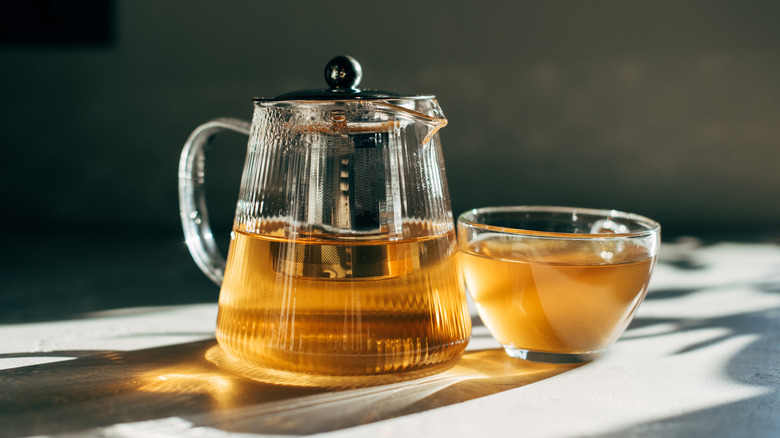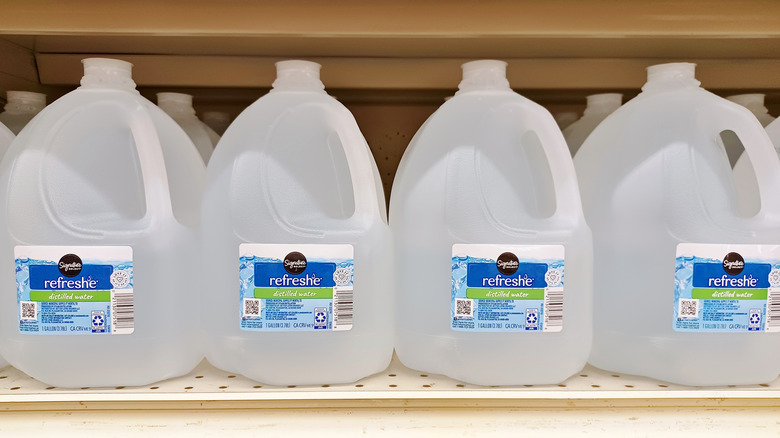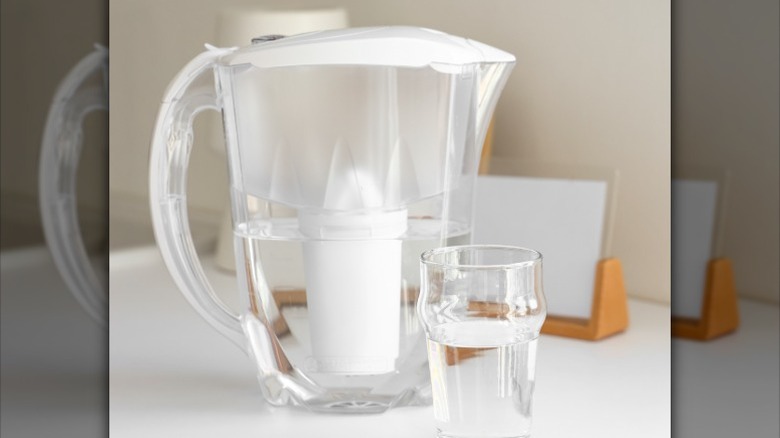The Worst Type Of Water To Use For Making Tea
We may receive a commission on purchases made from links.
Do you start your morning with coffee or tea? Both have their benefits, but if you're on Team Tea — perhaps even a true tea aficionado who can tell the difference between English and Irish Breakfast – you'll want to make sure you're up on all the top tips for brewing tea without ruining it. Today's helpful hint comes from Elle Liu, founder of the fine tea brand THEORÓ. Unsurprisingly, Liu warned against tap water, saying it can be hard, overly chlorinated, or otherwise treated. What may surprise you, though, is that she feels distilled water isn't much better.
"Distilled water can taste a bit flat or even slightly metallic, especially when heated," Liu explained. It can also be acidic, something she feels can dampen the taste of more delicate teas. She cautioned that when using distilled water, "Instead of feeling alive and expressive, the brew may taste thin or one-dimensional." Even so, she said she'd use it if her only alternative was tap water. "It's not perfect, but it's clean — and that matters more than anything," she concluded.
Why the distilling process ruins tea
So why does distilled water taste wrong? According to Elle Liu, "Because it's been stripped of all minerals, it tends to absorb carbon dioxide from the air more easily, which can lower the pH and make it mildly acidic." She also notes that removing the minerals deprives the water of structure, adding: "Minerals like calcium and magnesium help extract flavor and balance mouthfeel."
When it comes to making tea, Liu informed us, "Minerals matter because they interact with the compounds in the tea leaves — lifting aroma, supporting body, and rounding out the finish. For delicate white teas, they bring quiet structure. For more robust teas, they help anchor complexity." Certain teas are grown in mineral-rich soil, too (Liu mentioned an oolong variety called Wuyi Cliff as an example), and if brewed with water that still tastes of minerals, Liu said, "It's like reuniting the leaf with its home. The flavor becomes fuller, more resonant. Using distilled water for a tea like that would be a missed opportunity — it strips away the dialogue between the tea and its origin."
These are the best types of water for tea
If you happen to live in an ideal setting — high up a mountain, in a location where the air and water are clean as can be (and preferably in a time period that predates the Industrial Revolution) — then Elle Liu feels that rainwater would make the perfect choice. As she said, "Collected mindfully, it offers a soft, pure profile that complements the delicate nature of many white and green teas. It's a lovely reminder that tea, at its heart, is a conversation between sky, leaf, and earth."
If you live in the real world, however, she says spring water makes a pretty good alternative. In her opinion, "It feels closest to how tea was traditionally enjoyed. Historically, tea has always been grown in misty mountain regions, where spring water from the very same mountains would be used to boil the tea. That water, enriched by the land, carried the same mineral memory as the leaves themselves. It was never just water — it was part of the tea's origin."
If you're feeling less poetic or simply can't bring yourself to purchase water that comes packaged in plastic bottles, it's okay to use a water filter pitcher like the Amazon's 10-cup model. Liu called filtered water "a safe and accessible choice," and feels the filtering won't strip away too much of the water's flavor. As she advised, "If the water tastes good on its own, it will likely brew a beautiful cup."


